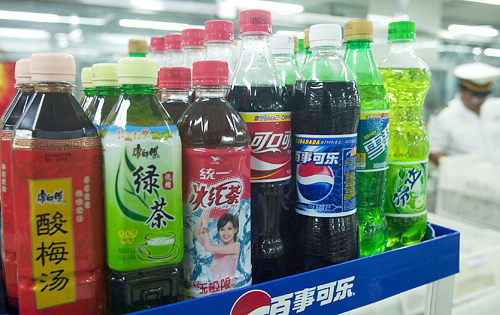|
 |
|
VYING FOR THE MARKET: Bottled drinks of Tingyi, PepsiCo and Coco-Cola at a store in Beijing (NEWSPHOTO) |
In a bid to compete with the Coco-Cola-Nestle partnership in the tea drink market, in 2003, PepsiCo and Unilever formed a 50-50 joint venture—Pepsi Lipton International—to manufacture and market Lipton ice tea in 67 countries.
However, the efforts produced few returns. Two years later Lipton ice tea was withdrawn from the market. "Although PepsiCo and Unilever were both foreign giants, it is still hard to integrate their business successfully because their products have too many differences," Chen said.
In spite of the assertion by PepsiCo's Chairman and CEO Indra K. Nooyi that "this is a positive deal for Pepsi, Tingyi, our existing Chinese bottling partners and consumers in China," analysts and industrial insiders see more challenges than benefits.
The biggest difficulty may come from the integration of different corporate cultures, according to Li Baojun, President of Societ Insights & Decision Co. Ltd. based in Shenzhen.
"Taiwanese enterprises value high efficiency and strict administration. The job cuts in PepsiCo's bottlers after the alliance cannot be avoided, which will be their first test," Li said.
Li's worry was vouched by the recent strike at PepsiCo bottling plants around China. Employees at PepsiCo China's bottling plants in Fuzhou of Fujian Province, Chongqing, Chengdu of Sichuan Province and Nanchang of Jiangxi Province protested against the strategic alliance, the Economic Observer reported November 14.
Production at many plants was seriously affected by the protests. Employees at Chongqing's Pepsi-Tianfu Beverage Co. stopped working and shut down production lines.
"Whether the cooperation could achieve success was decided by whether the two teams could be integrated well. The strike cast a shadow on the cooperation," Lei said.
"Tingyi has been expanding on the Chinese mainland more intrinsically, rather than by mergers and acquisitions. In this sense, Tingyi has got no experience in integrating acquired enterprises," said Li.
Tingyi also faces the immediate challenge of turning around PepsiCo's China businesses.
PepsiCo's bottling business in China has lost money for the past two years amid soaring raw materials costs and intense competition from Coca-Cola, whose share of the Chinese market is more than triple that of PepsiCo. PepsiCo's China bottling unit incurred after-tax losses of $175.6 million in 2010 alone.
"PepsiCo's problems that undermine its profitability will surely affect its integration with Tingyi," said Lou Xiangpeng, President of Beijing-based Fulai Branding Consulting Co. Ltd.
Given that PepsiCo is not the only controller of its bottling operation in China, Tingyi's new move in reforming its bottling sector will have to face negotiations with other investors. "This is going to be another big problem critical to successful integration. If it's not dealt with properly, turning around PepsiCo's loss-making bottling business will be impossible," Lou said.
Lou also said Tingyi and PepsiCo both produce soft drinks and it is essential for Tingyi to form a new product portfolio by repositioning its products.
According to Wei Ing-chou, Chairman of Tingyi, it will take three to five years to turn around PepsiCo China.
"China's beverage industry will face a tough market for the rest of this year and next as a result of tapering economic growth and fiercer price wars," said Wei.
According to China's Anti-monopoly Law, in a corporate merger if annual sales of the two merged enterprises exceed 10 billion yuan ($1.6 billion) and the sales of any party surpass 400 million yuan ($63 million), the merger must be subject to anti-monopoly constraints.
The marriage of two beverage giants has yet to win the nod from the Ministry of Commerce (MOFCOM). In March 2009, MOFCOM blocked Coca-Cola's acquisition of China Huiyuan Juice Group after a year-long investigation.
Even though the two sides preferred to call their deal a strategic alliance or equity swap rather than merger or acquisition, their weighty market share will not make them exempt from an anti-monopoly investigation.
"The cooperation will further strengthen Tingyi's leading position in China's soft drink market. Given its already high market share, its importance and significance in Chinese market will be enhanced," said Guo Risheng, an analyst with Beijing-based Guotai Junan Securities.
"We doubt the possibility of the approval from MOFCOM," said Guo. | 